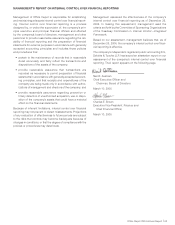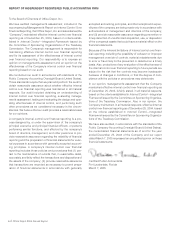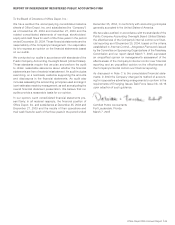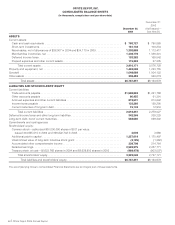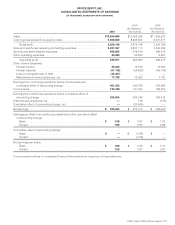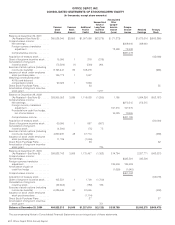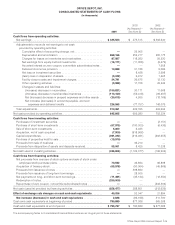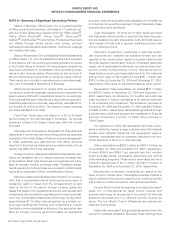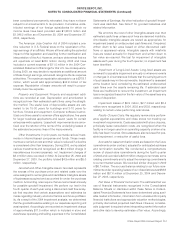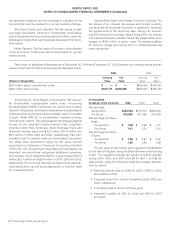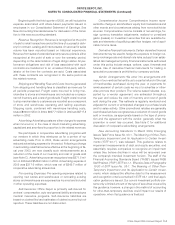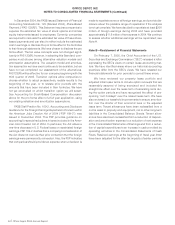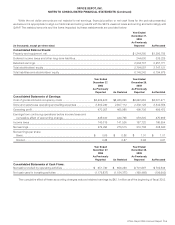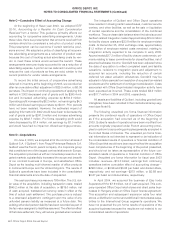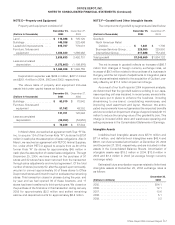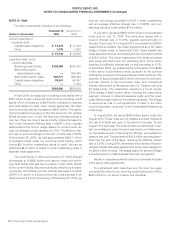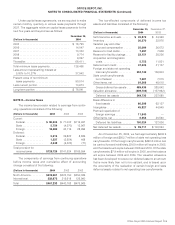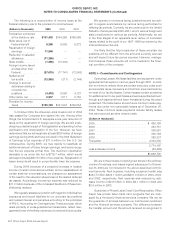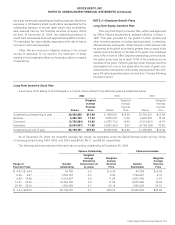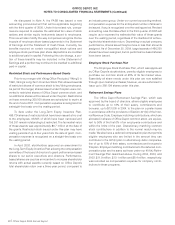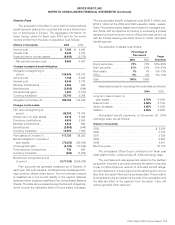Office Depot 2004 Annual Report Download - page 55
Download and view the complete annual report
Please find page 55 of the 2004 Office Depot annual report below. You can navigate through the pages in the report by either clicking on the pages listed below, or by using the keyword search tool below to find specific information within the annual report.Office Depot 2004 Annual Report |53
Beginning with the third quarter of 2005, we will include the
expense associated with share-based payments issued to
employees in our Consolidated Statement of Earnings. See
New Accounting Standards below for discussion of the transi-
tion to this new accounting standard.
Revenue Recognition: Revenue is recognized at the point
of sale for retail transactions and at the time of successful deliv-
ery for contract, catalog and Internet sales. An accrual for sales
returns has been recorded based on historical experience.
Revenue from sales of extended warranty service plans is either
recognized at the point of sale or over the warranty period,
depending on the determination of legal obligor status. All per-
formance obligations and risk of loss associated with such
contracts are transferred to an unrelated third-party admin-
istrator at the time the contracts are sold. Costs associated
with these contracts are recognized in the same period as
the related revenue.
Shipping and Handling Fees and Costs: Income generated
from shipping and handling fees is classified as revenues for
all periods presented. Freight costs incurred to bring mer-
chandise to stores and warehouses are included as a compo-
nent of inventory and costs of goods sold. Freight costs incurred
to ship merchandise to customers are recorded as a component
of store and warehouse operating and selling expenses.
Shipping costs, combined with warehouse handling costs,
totaled $940.0 million in 2004, $827.7 million in 2003 and $717.8
million in 2002.
Advertising: Advertising costs are either charged to expense
when incurred or, in the case of direct marketing advertising,
capitalized and amortized in proportion to the related revenues.
We participate in cooperative advertising programs with
our vendors in which they reimburse us for a portion of our
advertising costs. Prior to 2003, these vendor arrangements
reduced advertising expense for the period. Following a change
in accounting rules that became effective at the beginning of fis-
cal year 2003, we now classify such reimbursements as a
reduction of the costs of our inventory and cost of goods sold
(see Note C). Advertising expense recognized was $571.5 mil-
lion in 2004 and $546.9 million in 2003. Advertising expense in
2002 was $317.6 million, which was net of $242.7 million of
cooperative advertising allowances.
Pre-opening Expenses: Pre-opening expenses related to
opening new stores and warehouses or relocating existing
stores and warehouses are expensed as incurred and included
in other operating expenses.
Self-Insurance: Office Depot is primarily self-insured for
workers’ compensation, auto and general liability and employee
medical insurance programs. Self-insurance liabilities are
based on claims filed and estimates of claims incurred but not
reported. These liabilities are not discounted.
Comprehensive Income: Comprehensive income repre-
sents the change in stockholders’ equity from transactions and
other events and circumstances arising from non-stockholder
sources. Comprehensive income consists of net earnings, for-
eign currency translation adjustments, realized or unrealized
gains (losses) on investment securities that are available-for-
sale and elements of qualifying cash flow hedges, net of appli-
cable income taxes.
Derivative Financial Instruments: Certain derivative financial
instruments may be used to hedge the exposure to foreign cur-
rency exchange rate and interest rate risks, subject to an estab-
lished risk management policy. Financial instruments authorized
under this policy include swaps, options, caps, forwards and
futures. Use of derivative financial instruments for trading or
speculative purposes is prohibited by company policies.
Vendor Arrangements: We enter into arrangements with
many of our vendors that entitle us to a partial refund of the cost
of merchandise purchased during the year, or payments for
reimbursement of certain costs we incur to advertise or other-
wise promote their product. The volume based rebates, sup-
ported by a vendor agreement, are estimated throughout
the year and reduce the cost of inventory and cost of goods
sold during the year. This estimate is regularly monitored and
adjusted for current or anticipated changes in purchase levels
and for sales activity. Other promotional rebates are generally
event-based and are recognized as a reduction of cost of goods
sold or inventory, as appropriate based on the type of promo-
tion and the agreement with the vendor, generally when the
promotion or event has occurred. See Note C for additional
discussion of cooperative advertising arrangements.
New Accounting Standards: In March 2004, Emerging
Issues Task Force Issue No. 03-1, The Meaning of Other-Than-
Temporary Impairment and Its Application to Certain Invest-
ments (“EITF 03-1”), was released. This guidance relates to
impairment measurements of debt and equity securities, and
essentially requires companies to recognize an impairment
unless they believe declines in value will be recovered over
the company’s intended investment horizon. The staff of the
Financial Accounting Standards Board (“FASB”) issued FASB
Staff Position (“FSP”) EITF 03-1-1, Effective Date of Paragraphs
10-20 of EITF Issue No. 03-1, The Meaning of Other-Than-
Temporary Impairment and Its Application to Certain Invest-
ments, which delayed the effective date for the measurement
and recognition criteria contained in EITF 03-1 until final appli-
cation guidance is issued. Our current investment portfolio con-
tains only a limited amount of the type of securities covered by
this guidance; however, a change in the method of accounting
for other-than-temporary declines could impact our results of
operations, when that guidance is finalized.
OFFICE DEPOT, INC.
NOTES TO CONSOLIDATED FINANCIAL STATEMENTS (Continued)


